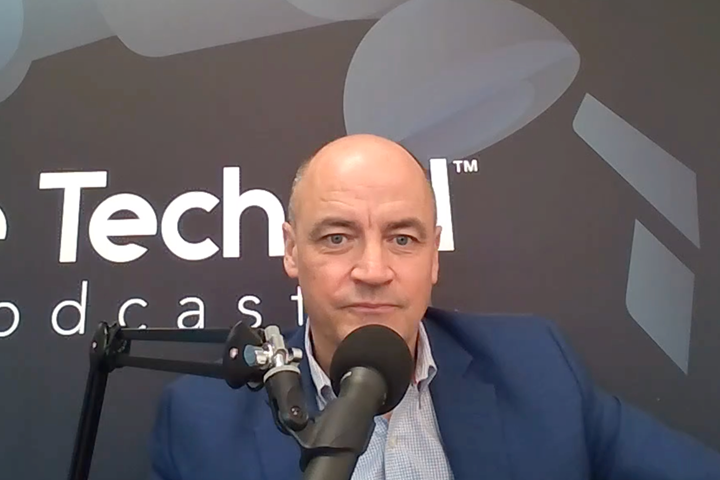Episode 31: An Interview with Matthew Kirchner, LAB Midwest
PF columnist and host of the TechEd Podcast Matthew Kirchner, president of LAB Midwest, discusses the latest in workforce trends in the manufacturing and finishing industries.

PF catches up with manufacturing education consultant and TechEd podcast host Matthew Kirchner.
Photo Credit: Products Finishing
Skilled labor shortages and downtrends in the workforce have been a continuous concern for the manufacturing industry for some time. The COVID pandemic exacerbated the situation, contributing to what came to be known as the Great Resignation — a time when people left jobs in droves, either retiring early or simply quitting. As the world struggles to return to normality in so many aspects of life, some things seem to have rebounded. But, are we truly back to normal when it comes to the workforce — and is “normal” even sufficient to meet the rising demands for manufactured products (and finishes for the components that comprise them)? In this installment of On the Line, Products Finishing catches up with PF columnist and host of the TechEd Podcast Matthew Kirchner, president of LAB Midwest, a distributor of e-learning and hands-on training equipment dedicated to furthering industrial education programs and workforce training. Kirchner has been involved directly in manufacturing for more than 20 years and has spent the last eight years working in the education and training for those interested in pursuing or furthering careers in manufacturing. Listen to his thoughts on today’s workforce dilemma in the latest episode of PF’s On the Line podcast (stream above) or check out an excerpt from the interview below.
Matthew Kirchner interview excerpt:
In the past few years, particularly with COVID, we experienced a disturbing trend of people essentially dropping out of the workforce — do you think we’ve rebounded from that?
We’ve rebounded in terms of having more open workspaces and people working more closely together. From that standpoint, things are much better. But, we are still facing a lot of the same challenges that we were pre-COVID.
There’s a survey that just came out here in my home state of Wisconsin [conducted by Wisconsin Manufacturers and Commerce]: 85% of manufacturers in the state of Wisconsin are still saying that they’re having a hard time finding people. And, that’s not surprising. I was out in San Diego last week for a big automation conference, and that was the topic every single speaker got up and talked about — the challenges in the workforce.
So, I think there are a few things that are driving that. We’re still at a time where one in eight working-age males are sitting out of the workforce (which just blows my mind). We’ve got literally like 12–13% of men between the ages of 24 and 55 that are not working … So, we have some big challenges in the workforce.
What are your thoughts on the job market and what some of this “checking out” means for ambitious people that are looking for a career that they can grow?
Finishing companies are now being forced to compete for talent. When 85% of manufacturers are saying, “We can’t find enough people,” it’s not enough to put an ad out there or go to a temp service and say, “Hey, give me some bodies.” We have to create a culture and an environment that attracts really good talent. And so, if you are the kind of person that has a degree of talent and has a level of proficiency that allows you to add value in a finishing operation (or in a powder coating operation or metal plating operation) — if you’re that type of person, the opportunities are endless.
The one thing we forget about is that — at least in my state of Wisconsin — the average manufacturing job here pays $75,000 a year … there aren’t a lot of markets where you can make that kind of money.
Especially now — in an environment that is advancing and becoming way more interesting, way more technical — in this day and age of disruption in the workforce, for the people that figure out how to play that game and play it well… there are going to be a ton of opportunities for those individuals.
How do you think the perception of manufacturing jobs as “dirty jobs” is changing?
I will tell you — having been in the business of training and advocating for the future of the American worker for seven years or so — that we’re starting to see the perceptions of manufacturing on the part of potential employees, on the part of parents, of young people and many others, start to change. I think that’s really positive. I think it bodes well for the future of the American manufacturing workforce and for the finishing market in particular.
Related Content
Unique and Evolving Electroplating Training
Offering a standard online course as well as on-site custom courses, this training firm uses student feedback to continuously improve its courses to reach industry training needs.
Read MoreProducts Finishing Opens Nominations for 2025 40 Under 40 Program
PF is looking for emerging leaders who are making a difference in the surface finishing industry. Deadline for nominations is January 17, 2025.
Read MoreDefining a Top Shop: Quality, Quickness, Communication, Community
Luke Engineering & Anodizing Co. takes an active role in its community and the industry while also focusing heavily on the quality of its work and employee treatment.
Read MoreLooking to the Future of Finishing
Products Finishing takes a look at some of the ways the finishing industry is investing in workforce development and educational initiatives.
Read MoreRead Next
Logical Fallacies in Finishing
Some examples of logical fallacies and how they manifest themselves in the world of surface finishing
Read MoreDemystifying Artificial Intelligence
Head to your next team meeting with just enough AI knowledge to be the “expert” and launch your journey.
Read MoreBeware the Employee Freeloader
Clearly communicate expectations, set goals, measure performance and trust your instincts.
Read More















